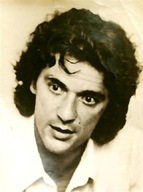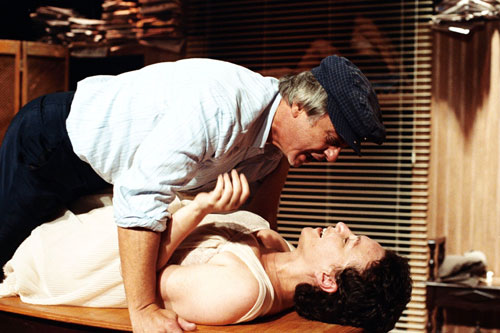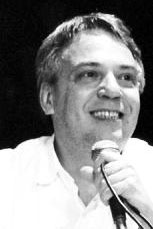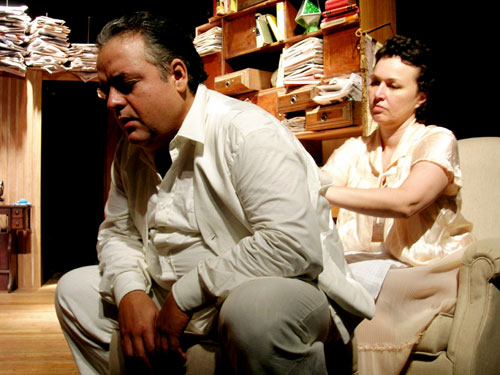|
Catulo da Paixão Cearense e Anacleto de Medeiros' song inspired the playwright Oduvaldo Vianna Filho (1936-1974) to title his last play: "Rasga Coração". A censored text, prohibited to be staged, a testament-play almost unable to be written. He had to dictate the second act to his mother -- he could no longer write in a hospital bed, days before his death. A last chapter of a life history, Vianna Filho's own heart torn apart.
Oduvaldo Vianna Filho is recognized as one of the most important modern Brazilian playwrights.  During such a short lifetime, Vianna Filho (or "Vianinha" as he is also known) was an actor, a TV and theatre playwright and also a producer. During such a short lifetime, Vianna Filho (or "Vianinha" as he is also known) was an actor, a TV and theatre playwright and also a producer.
But as a theatre playwright, Vianna Filho had definitely affirmed his name. His plays – as a Bretch follower – investigates critically Brazilian social history, showing coherently the social and political changes for what Vianinha himself has always searched and fought. For him, theatre should be addressed only to its time, for the people "here and now". Theatre as an instrument of intervention in the social and political moment. But being so, Vianinha's work has achieved a place of reference point, reflecting the conflicts and ideologies of the dictatorship period in Brazil, together with an impressive control of dramatic writing.
He saw some of his great texts censored by the military government; as the two of his last plays: "Rasga Coração" is one of those. The first staging was in 1979, directed by José Renato, with Raul Cortez, Ary Fontoura and Lucélia Santos.
Now "Rasga Coração" is being staged in Rio de Janeiro, directed by Dudu Sandroni. The play has also Zécarlos Machado, as Maguary Pistolão, Kelzy Ecard as Nena, and Xando Graça, Pedro Rocha, Expedito Barreira, Alexandre Mofati, Alexandre Dacosta, Miriam Roia and Tiago D'Avila.

Through the story of Manguary Pistolão, "Rasga Coração" outlines important recent historical moments in Brazilian history from the 30's to the 70's. With sharp and poetic dramatic writing, Vianna Filho works with the two chronological dimensions of time - present and the past - as if he were saying that the present cannot be explained without a careful look at the past, or as he writes in the preface of the play: " 'Rasga Coração' is a homage to the anonymous fighter(...) The revolutionary is not always new and the new is not always revolutionary". Words of premonition...
However, this important topic in Vianna Filho's work does not seem to have any impact on today's generation, for whom the individual project takes over any collective fight. In Vianna Filho's work, as Dudu Sandroni explains, "the great revolution is against the individual project of the protagonists that with no choice have to assume a social status that seems to deny the Revolution purpose. That happens in "Moço em estado de sítio" and in "Mão na luva". Only in "Rasga Coração", Maguary Pistolão is going to defend his "small revolution", the daily revolution. That is his last play, his testament-play, written between '72 and '74, a period of a strong military dictatorship, so this play is almost a defense of a political strategy: how to survive politically under a military regime! Actually, politics is in the day-to-day life, but also we have the great politics. However in times of such political corruption it makes us sick that it is also a road we cannot ignore, in our democratic time, that Vianinha would be proud to see!".
"Rasga Coração" brings Dudu Sandroni to stage again as a director of theatre for adults after some years working as a producer and at children's theatre.  But why Vianinha? Dudu reveals: "As an artist, I am interested in his poetic drama. He is an expert in dramatic writing, a drama poet. Anything he could have written about, not necessarily politics as he did, he would be a great author anyway". But why Vianinha? Dudu reveals: "As an artist, I am interested in his poetic drama. He is an expert in dramatic writing, a drama poet. Anything he could have written about, not necessarily politics as he did, he would be a great author anyway".
Dudu also reveals his long time passion for Vianna Filho: "My favorite TV show was "A Grande Família" created and written by him even before I was introduced to his work. Some "Casos Especiais", also a TV show, had impressed me very much at that time. In 1979 the impact of the brilliant staging of "Rasga Coração", directed by Zé Renato. Afterwards, in 1986,"Mão na luva", directed by Aderbal Freire Filho, with Marco Nanini and Juliana Carneiro da Cunha--great works! On the day I saw "Mão na luva", with my dear friend Helena Varvaki, we made a promise: in 10 years we would stage that play. The promise finally was fulfilled in 1998, 12 years later and that was my first direction of Vianna's play, and practically my last direction in adult theatre."
Dudu Sandroni answered some questions about his work in "Rasga Coração", and his special and 'personal revolution' among other topics.
What are the other aspects of Vianna's "Rasga Coração" that say something to you, as an artist, that you did not find in any other work?
As an artist, the poetry of his playwrighting is interesting to me. In "Rasga Coração" he works time and space with a great freedom, as he had already tried in "Mão na luva". In one moment the characters are at Copacabana beach in 1917. The following moment they are inside an apartment in Copacabana in 1972. A character in 1930 plays with the same Manguary Pistolão that is playing with his son in 1972! It is apparently a difficult and confused thing but when we stage that and we see the play going on, it shows a clear and stunning poetry!

And what is your personal and small revolution? Is it in theatre?
My small revolution is to raise my son, Pedro, who is 4, to be a good father. I try to prepare Pedro to be a good man. For that, I try to improve myself, to be happy, to be a good example. In theatre I am an artist, a poet. I do not want to be known as a director of political theatre. I am going to do what is good and what speaks for itself. I have also a political interest, I am a person who worries about social questions. That was always very present in my life, since my student days, when I took part in the student's political movement, fighting for all the democratic movements for the end of the military regime. It is clear that this tendency makes me choose plays where the political question is concerned. But that it is not my main question in my theatre work. I insist: if "Rasga Coração" was not a wonderful play I would not stage it just because it deals with political themes!
Vianinha is considered a dated author. How can that be for such a great author ?
One of my biggest joys in this exceptional season is that we are changing that idea. The audience becomes amazed at the quality of the playwrighting. Even those who attended the first performance of the play. They usually say: I did not remember it was like that! It is understandable, because the first staging of "Rasga Coração" in 1979 was very committed to Vianinha's death, to the years that the play was censored by the military government, by what it meant at that moment. That was the year of the political changes, the play was liberated to stage, democracy getting spaces, the last moments of the dictatorship, finally. So, under such condition, the playwrighting was really considered second rate. It was considered a political manifesto. But the fact is that nobody was concerned in reading from the second line on. If they did , they would have noticed an astonishing play! I am proud to show a new author: Vianinha! I think that from now on there is going to be a rediscovery of his work, I know about two projects in course, and I will work in another also. Meeting again such a genial playwright is something very good for Brazilian theatre.
What is the great contribution of Vianinha's work?
The great playwright he was. An artist who knew how to talk about his time and to the future.
You have been out of the theatre directing for a time. What have you been doing?
For the last nine years I felt discouraged to face a huge work, to stage a play. The absence of resources, support, etc. I was working with institutional projects Рchildren's plays at the Calouste Gulbenkian Cultural Center; a Scenic Arts Advisor for the State Rio de Janeiro Government's for 11 months; an Opera Coordinator at the Theatro Municipal, and assistant director at Aderbal Freire-Filho's plays Р"A Prova", and producer also in "O que diz Molero". Two years ago, producing for my wife, the actress Kelzy Ecard, and at the same time seeing her fight to produce, and on the other hand seeing that were new sponsorship possibilities: the Myrian Muniz Prize; the Fate Prize, finally, things seemed to be improving; so came this feeling of "starting again". One day talking to a friend about theatre, he said: "The best play I have ever seen was "Rasga Coração"! In that moment I woke up. "Rasga Coração" became my project afterwards.
Is this the most difficult time for theatre production in your opinion?
Unfortunately I think so. Since Collor's government, the Culture Ministry does not have a political sense for theatre. We just have the Rouanet cultural law. Last year the Myriam Muniz prize was a blessing for producers. "Rasga Coração" is being sponsored by that. But it is not enough. It is necessary that a broad political sense for theatre comes back to the importance it had in the 60's to the 80's. The minister Gilberto Gil is doing wonderful management in several cultural areas - museums, heritage, re-structuring of the Ministry, cinema - , but regarding theatre and the scenic arts in general, the first four years of Lula's government were a disaster. In Rio de Janeiro, State and City, the last years were really bad. In fact so much is discussed about theatre, but no one has a broader political proposal.
You have said that you thank your wife Kelzy for again working on your own projects. So what will be the next?
"Rasga Coração", "Rasga Coração" and afterwards "Rasga Coração". I am still totally absorbed by "Rasga Coração", the season is marvelous, a theatre party!
And how is it to work with your family?
At work, we are professionals. In "Rasga Coração" we took that seriously, we almost had no conversation about work at home, just at the rehearsals. That was good for our work, for me as the director, Kelzy as the actress, because it is necessary to have a time for ourselves after the rehearsal delirium, it is necessary to be alone, to reflect, relax, to save energy for the rehearsals. In "Rasga Coração" I also had my sister Paula Sandroni as an assistant director. I already adapted to theatre the books of my sister Luciana Sandroni, a children's literature writer, and also directed the shows of my other sister Clara Sandroni, a singer. Also I have directed my mother, Laura Sandroni! She is a singer in a group called "Cantores do Chuveiro"! I do not have any problem working with my family, when the family joins so many talented people! We just cannot bring work home, literally!
What's the future of "Rasga Coração"?
The production goes on with great difficulties, we don't have another season yet, but I am sure that things are going to happen and that our show, so acknowledged by all the staff, by the theatre team and by the audience is going to tour a lot! We are working for that.
Oduvaldo Vianna Filho's plays
Se correr o bicho pega, se ficar o bicho come (1966)
M√£o na Luva (1966)
Papa Highirte (1968)
A longa noite de cristal (1971)
Corpo a corpo (1971)
Em família (1972)
Allegro desbum (1973)
Rasga Coração (1974)
* If you want to see the immensity of the heaven and sea/Reflecting the sun's light /Tear my heart apart, come to bend over/About the vastness of my suffering /Tear apart and then you will see/My pain crying
Photos by Luiz Henrique S√°
|
